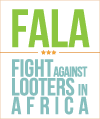CONTROL THE RISKS AND PROTECT BIODIVERSITY
Protecting biodiversity, natural heritage, the lives of large animals and parks.
©WCS
©WCS
Who we are
FALA is a not-for-profit organisation specialising in biodiversity conservation in areas with significant security challenges. We offer our partners comprehensive and integrated protection solutions, including the fight against environmental crime, securing goods and people in the field, and the management of reputational risk for donors, NGOs and private entities.
As an independent entity, free from any external influence, FALA is committed to actions based on rigorous ethics, in full compliance with the Universal Declaration of Human Rights. Pragmatic and effective, our work is based on clear, measurable and transparent performance indicators, enabling us to monitor the impact of our actions as effectively as possible.
Our experts, recruited from the most experienced special units, have many years' experience in securing protected areas in Africa. They stand out for their in-depth knowledge of African cultures, particularly in French-speaking regions, and for their ability to interact effectively with the institutional players involved in managing protected areas.
Strategic and tactical support
FALA offers personalised support, in line with the management mandate of its partners and the requirements of the countries concerned. Our intervention includes :
©FPF
Training and capacity-building programme for ecoguards
FALA offers personalised support, in line with the management mandate of its partners and the requirements of the countries concerned. Our services include :
01
©FPF
Rigorous selection of candidates
02
©FPF
General training for eco-guards (3 months)
03
©WCS - Hugh Kinsella Cunningham
Training for higher grade (or function) promotion
04
©FPF
Specialised training (1 to 2 months)
Advanced modules to enhance ecoguards’ skills, including :
Possibility of adjusting the programme and specialities according to partners' needs.
05
©FPF
Training special intervention units*
* Can only be set up following the 4 previous stages
06
©WCS
Raising awareness and training civilian and expatriate staff
07
©WCS
Skills monitoring and assessment
©WCS
Optimising material resources for safety and training
The effective implementation of conservation strategies and training depends on appropriate equipment. On request, FALA offers an assessment of equipment and supplies quality material, thereby easing the logistical constraints of its partners.
As part of the training, the use of specific equipment from the start of the exercises is essential. An ecoguard must master his equipment during his training to optimise his operational efficiency and limit the risks of mission failure.
©WCS
Intelligence and investigation process
As part of a global and coherent approach to security, FALA provides specialist investigators capable of establishing intelligence and investigation structures within protected areas. This highly sensitive mission is carried out in strict compliance with national legal frameworks and applicable international conventions.
In the field of conservation, intelligence is an essential judicial police function, carried out in coordination with the competent authorities. This system is particularly effective in the fight against organised crime networks involved in environmental damage. It also plays a key role in detecting and preventing internal corruption, guaranteeing the integrity of the services responsible for protecting ecosystems.
The effectiveness of enforcement measures rests on two fundamental pillars: credibility and trust. A fair and impartial approach is essential to ensure the support of stakeholders and the sustainability of enforcement actions. The rule of law must therefore prevail: one rule for all, that of the law.
Human rights: "winning hearts and minds
Respect for human rights is a fundamental requirement for any biodiversity protection service. In some regions, where tourism has not yet compensated for the economic losses caused by restrictions on access to resources, the work of ecoguards can be perceived negatively by local populations.
In this context, every agent, ecoguard or management staff member is an ambassador for conservation. Exemplarity and integrity in their actions are the best means of defending wildlife and ensuring that laws are applied ethically. FALA is committed to ensuring the probity of its employees and to promoting a culture of respect for human rights through rigorous training and ongoing awareness-raising.
Drawing on its African expertise, FALA integrates local traditional and religious structures to reinforce its message of respect and inclusion. In addition, strict control mechanisms are put in place:
Through this approach, FALA guarantees a professional, transparent framework for intervention that respects universal human rights principles.
